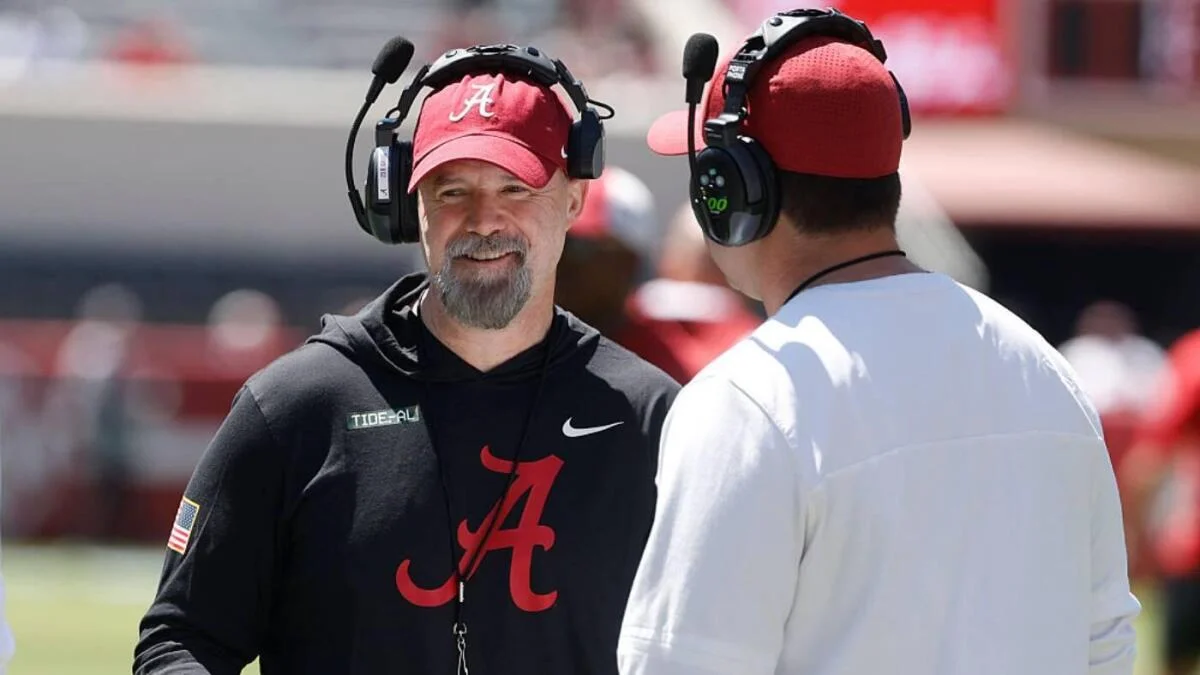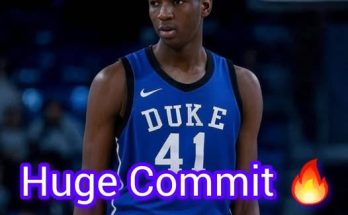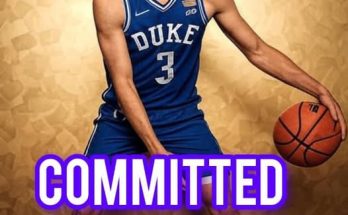The name Ryan Grubb has quickly risen from the realm of respected offensive minds to one that’s being actively whispered in the offices of athletic directors across the country. The Alabama offensive coordinator, who arrived in Tuscaloosa with a sterling reputation and a sharp mind for the game, is no longer just a behind-the-scenes architect. He’s now a leading man in the making, and the buzz is building fast. As college football continues its relentless search for fresh, dynamic leadership, Grubb’s name is becoming increasingly difficult to ignore.
At Alabama, the expectations are always national-title high, and the spotlight is blinding. That’s not an easy environment for anyone, especially a coordinator stepping into one of the most scrutinized jobs in sports. But Grubb hasn’t just survived—he’s thrived. His offensive schemes have breathed new life into a Crimson Tide team in transition, keeping Alabama’s attack not only competitive but creatively explosive. In a league where innovation and adaptability determine success, Grubb has proven he’s ahead of the curve.
Coaches like Grubb don’t go unnoticed for long. Already, insiders are pointing to him as a top-tier head coaching prospect. The combination of his cerebral play-calling, ability to adjust mid-game, and knack for player development makes him an incredibly appealing figure for programs looking to either rebuild or elevate. More importantly, Grubb understands what it takes to win—not just in theory, but in the toughest conference in the nation, under the brightest lights.
He arrived at Alabama as part of Kalen DeBoer’s staff after years of collaboration and success. Their partnership has already produced fireworks, and Grubb has seamlessly adapted to the SEC. From the moment he stepped foot in Tuscaloosa, he made it clear that he wasn’t just there to hold a clipboard. He was there to make a statement, and every week, he’s doing just that.
Grubb’s background is as diverse as it is impressive. He’s coached at nearly every level of football, giving him a unique perspective and a grounded approach to leadership. That kind of experience is invaluable. It teaches humility, patience, and resilience—qualities that can make or break a head coach. His rise has been methodical, not rushed, and that’s exactly why it feels sustainable. He’s not just another hot name; he’s a name with substance, strategy, and a growing list of victories.
This isn’t just about X’s and O’s. Grubb connects with his players. In an era when the transfer portal and NIL have transformed college football into a complex web of relationships, loyalty, and opportunity, a coach who can build trust and maintain culture is gold. Talk to Alabama players, and they’ll tell you: Grubb is the real deal. He listens. He adapts. He puts them in positions to succeed, not just on the field but off it. That kind of leadership resonates far beyond game day.
Programs seeking new direction are taking notice. Whether it’s a Power Five school in need of a culture overhaul or a once-proud program looking to return to relevance, Grubb checks all the boxes. He’s proven he can lead elite athletes, manage big-time expectations, and outthink some of the best defensive minds in the country. That doesn’t just make him a good candidate—it makes him the kind of hire who could change the trajectory of a program overnight.
It’s rare to find someone who blends football intellect with genuine human leadership. Grubb doesn’t just call plays—he tells stories through his offense. Every snap feels deliberate. Every drive has rhythm. There’s a flow to his game plans that keeps defenses off balance and fans on the edge of their seats. More importantly, he prepares his quarterbacks not just to perform, but to lead. His track record with signal-callers is especially noteworthy, and in a sport so heavily driven by quarterback play, that’s a serious asset.
But Grubb’s potential goes far beyond schematics. He’s shown an ability to create systems that adapt to his personnel rather than forcing players into rigid roles. That flexibility is essential at the head coaching level, where injuries, transfers, and recruiting fluctuations demand constant evolution. Grubb is a thinker and a builder. He’s already built powerful offenses. Now, many believe he’s ready to build a program.
There’s also something refreshing about his demeanor. He’s intense but not abrasive, confident but not arrogant. He exudes a quiet strength—an aura that suggests he’s not chasing the spotlight, but also won’t flinch when it finds him. That temperament could serve him well when the scrutiny intensifies. Because let’s be clear: if he becomes a head coach—and all signs suggest it’s a matter of when, not if—he’ll be expected to win, and win fast.
In many ways, Grubb represents the future of college coaching. He’s not a legacy name or a recycled figure from the coaching carousel. He’s part of a new generation that blends old-school fundamentals with modern-day strategy and relational leadership. That’s what schools are hunting for: a coach who can win games and build men, someone who understands both football and the evolving ecosystem around it.
It’s also hard to ignore the pedigree. Working alongside Kalen DeBoer, and now operating within the powerhouse that is Alabama football, has only sharpened Grubb’s tools. He’s seen what championship culture looks like up close, and he’s contributed directly to it. That kind of first-hand exposure to greatness doesn’t just teach—it transforms. It’s no surprise that schools looking to mimic that success want a piece of what Grubb brings to the table.
Recruiting is another area where Grubb’s star continues to rise. He’s known for his ability to identify talent others overlook and develop that talent into high-level contributors. That’s the mark of a true program builder. Whether it’s a four-star quarterback or a lesser-known receiver, Grubb finds ways to maximize potential. And in a sport where player development can often separate contenders from pretenders, that skill is invaluable.
Even beyond the field, Grubb seems to understand the larger picture. He’s media-savvy without being overexposed. He knows how to speak to boosters, how to energize a fanbase, and how to represent a program with class. Those might seem like small details, but they matter at the head coaching level—especially in a high-pressure job where every word and decision is dissected.
The clock may already be ticking for Alabama to hold on to Grubb for long. If his offense continues to perform at an elite level, and if Alabama remains in the national spotlight, schools in need of a head coach are going to come calling—and fast. That’s the price of success. And it’s a reflection of just how respected and valuable Grubb has become in such a short time.
What remains to be seen is where Grubb might land when the opportunity arrives. Will he take over a struggling Power Five program and try to turn it into a contender? Will he be handed the reins of a school on the cusp of greatness, tasked with getting them over the hump? Or will he stay patient, wait for the perfect situation, and make his move only when the timing and alignment are flawless?
Regardless of where he ends up, one thing is certain: Ryan Grubb is on the rise. And it’s not just talk anymore. His name is on shortlists. His film is being studied. His leadership is being modeled. In the high-stakes world of college football, where every decision is magnified and every hire can change the future, Grubb has become one of the most intriguing figures in the game.
For now, Alabama fans can enjoy the brilliance he brings to their sideline. But they’d be wise to savor every moment—because the rest of the country is watching, and it won’t be long before Ryan Grubb is leading a team of his own, not just calling the shots, but setting the standard.



